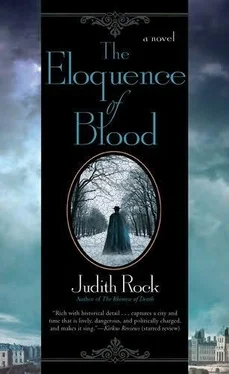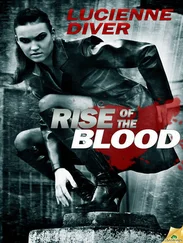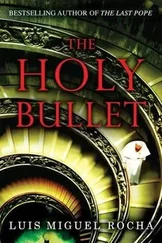Judith Rock - The Eloquence of Blood
Здесь есть возможность читать онлайн «Judith Rock - The Eloquence of Blood» весь текст электронной книги совершенно бесплатно (целиком полную версию без сокращений). В некоторых случаях можно слушать аудио, скачать через торрент в формате fb2 и присутствует краткое содержание. Жанр: Исторический детектив, на английском языке. Описание произведения, (предисловие) а так же отзывы посетителей доступны на портале библиотеки ЛибКат.
- Название:The Eloquence of Blood
- Автор:
- Жанр:
- Год:неизвестен
- ISBN:нет данных
- Рейтинг книги:5 / 5. Голосов: 1
-
Избранное:Добавить в избранное
- Отзывы:
-
Ваша оценка:
- 100
- 1
- 2
- 3
- 4
- 5
The Eloquence of Blood: краткое содержание, описание и аннотация
Предлагаем к чтению аннотацию, описание, краткое содержание или предисловие (зависит от того, что написал сам автор книги «The Eloquence of Blood»). Если вы не нашли необходимую информацию о книге — напишите в комментариях, мы постараемся отыскать её.
The Eloquence of Blood — читать онлайн бесплатно полную книгу (весь текст) целиком
Ниже представлен текст книги, разбитый по страницам. Система сохранения места последней прочитанной страницы, позволяет с удобством читать онлайн бесплатно книгу «The Eloquence of Blood», без необходимости каждый раз заново искать на чём Вы остановились. Поставьте закладку, и сможете в любой момент перейти на страницу, на которой закончили чтение.
Интервал:
Закладка:
“Well, think of something and make the Society of Jesus do it as a work of mercy.”
A quarter mile or so outside the city, Damiot drew his horse to a halt beside a long high wall on the left of the road. “There it is.”
A stone-shingled roof surmounted by a cross rose above the wall. Charles dismounted, leaving Damiot waiting in the dirt road, and led Flamme to the bell beside the stout wooden gate. Shivering in the wind that had risen, he rang the bell. In the last few minutes, the bright day had darkened, and as the grille slid open, Charles hoped for an invitation to talk inside.
“Yes?” The nun on the other side of the grille studied him and then glanced beyond his shoulder at Damiot. A small frown appeared between her black eyebrows. “A good year to you, mes peres.” Her voice was soft but there was no friendliness in her dark eyes. “How may I help you?”
“A good year to you, ma soeur. I am hoping to learn something about a foundling who may have been here fifteen years ago, perhaps a little more.” Even as he said it, Charles realized what a hopeless question it was. “He was called Tito La Rue.”
“We name many of them La Rue. The street is where we find them, after all. This Tito would not have been here. Our house for older children was in the Faubourg St. Denis then.”
“Do you have records of the children?”
“Not here, not so far back. If he was brought as an infant to the Couche, near the Hotel Dieu on the Ile, someone there may remember. Go with God, mes peres.” She shut the grille and its bolt scraped across the iron.
Chapter 19
ST. BASIL’S DAY, THURSDAY, JANUARY 2
The night was quiet, but Charles’s sleep was not. He dreamed of grilles and prisoners. Martine Mynette reached through the Foundling Hospital’s grille to give him the little heart she wore around her neck, but when he reached out to take it, her hand was full of blood. Gilles Brion stared through the grille in his cell door until Reine, who had come to visit him, reached through and strangled him with his red-beaded rosary. Wearing a galley slave’s iron collar and chain around his neck, La Reynie chased Marin through the church of St. Louis. Then a hand reached through the wall behind the altar and they both screamed in terror. The screaming turned into the rising bell and Charles sat up in bed, sweating in spite of the frigid air seeping through the temporary canvas over the window.
He dressed in a fever of haste and flung himself down at his prie-dieu. Fervently, he said the rising prayers, giving thanks for deliverance from night and darkness, and the Hours of Our Lady. He also gave thanks that the trouble La Reynie feared at the college had not come in the night, that the only troubles had been in his dreams.
In the chapel, kneeling on the icy stone floor and blowing on his clasped hands to warm them, he saw that a red chalk drawing of St. Ignatius’s death mask was newly hung near the altar. Studying the saint’s face comforted him a little, made him feel the littleness of his own fears and desires. Somewhat calmed, he prayed his way into the sacrament of communion, trying to open his heart to whatever the Silence had to say to him. Little by little, as the sacrament was celebrated and the Mass wound to its end, his heart filled with a terrible urgency. Nothing is wasted, the Silence had told him. Unless you waste it. If he wasted the chance he’d been given to find Martine Mynette’s killer, and Henri Brion’s, Gilles Brion was going to die as a double murderer. Isabel Brion and her great-uncle would be ostracized and indelibly marked by the scandal. Isabel would no doubt refuse to marry Germain Morel-for his own good, she would say. An innocent man would die horribly and at least three lives would be twisted past mending.
Gilles Brion’s hopeless face seemed to follow Charles through the dark morning to the fathers’ refectory. Dry-mouthed with fear that he would fail to prevent tragedy, Charles found he couldn’t force the breakfast bread down his throat. He swallowed the icy watered wine and fled, thinking how to find out where the city’s foundling records were kept, but the day’s trouble found him before he reached the street passage.
“Maitre!” Pere Montville, the new principal, loomed out of the dark of the Cour d’honneur. “Our day boys are being attacked at the stable gate. Go and do what you can, I’m going for Frere Brunet!”
Charles sprinted across the courtyard’s riffs of snow. Every morning, Louis le Grand’s day boys poured in through several gates and doors opening on surrounding streets. The youngest used the stable gate. In the court where the student library was, a half dozen other breathless Jesuits caught up with Charles, all spilling together through the archway into the stable court, hindering each other in their haste. Charles felt the familiar momentary twist of his mind back into battle. Engulfed in the furious shouts ringing in the cold air, in shifting darkness and lantern light, in the cries for help, he threw himself at the gate into the lane, where a tangle of boys punched and kicked and shouted abuse. But these combatants were ten, twelve, fifteen years old, most wearing scholars’ gowns and apprentices’ aprons, and Charles was abruptly back in his present life. He reached into the tangle with both hands, grabbed two grappling boys by the backs of their clothing, and held them off the ground.
“Stop it,” he said quietly, having learned from teaching that an ominously quiet voice did more than yelling. Both boys went limp. The boy in the long Louis le Grand scholar’s gown looked about twelve and seemed to be bleeding from his eye. The other, perhaps fifteen and aproned like an apprentice, held his ribs as though they might collapse into fragments if he let them go. “Go for each other again, or for anyone else, and I’ll throw you back into the fight and let the rest finish you off.”
The student nodded, but the apprentice was too busy fighting tears as pain overcame his battle lust.
Charles set them on their feet. “Take your enemy here to Frere Brunet,” he told the Louis le Grand boy. “He can have a look at you both.”
The student pushed the apprentice none too gently toward the archway. When the apprentice stumbled and cried out, the student offered a reluctant arm, and they wobbled away together.
Other Jesuits had sorted out the rest of the gateway tangle, and Charles pushed his way into the lane, which was still full of shouts and wrestling and shoving. Ducking to avoid a rain of snowballs-laced with rocks, by the sound they made hitting the college wall-he was reaching for another pair of adversaries when a shadow running toward the end of the lane caught his eye. The shadow’s shape told him it was a woman, and something about her seemed familiar. Charles went after her. As he knew to his cost from the brawl outside the tavern, it was not only men accusing the Jesuits of conniving at murder. Anyone running through the lane this morning needed to account for himself. Or herself. But before Charles caught up with the woman, he stumbled over a body.
Not a dead body, thank God. Charles bent closer and put his hand on the warm face. The boy was breathing, but he was ominously still. His scholar’s gown was torn half off him, and Charles’s hand came away wet with blood from the smooth cheek. He wiped the boy’s face with his cloak, seeing in the slowly growing light that the blood was from a badly broken nose. Probably from snow packed around a stone, which had also knocked its victim out of his wits. As he picked the boy up, another hail of snowballs came at him, along with raucous singing from farther down the lane.
“Le notaire, il etait fort, mais cette notaire est aussi mort! Il est perdue, pour ainsi dire, Les Jesuites pour enrichir!”
Читать дальшеИнтервал:
Закладка:
Похожие книги на «The Eloquence of Blood»
Представляем Вашему вниманию похожие книги на «The Eloquence of Blood» списком для выбора. Мы отобрали схожую по названию и смыслу литературу в надежде предоставить читателям больше вариантов отыскать новые, интересные, ещё непрочитанные произведения.
Обсуждение, отзывы о книге «The Eloquence of Blood» и просто собственные мнения читателей. Оставьте ваши комментарии, напишите, что Вы думаете о произведении, его смысле или главных героях. Укажите что конкретно понравилось, а что нет, и почему Вы так считаете.












